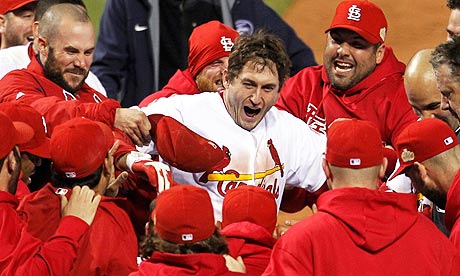Last week this blog post highlighted the importance of not allowing complacency to stunt our growth early in our faith journey. This week, regular contributor Jeremy Hoover looks at the lessons we can learn from the other end of the season, the Playoffs.
The entire 82-game NHL season is a war, out of which only
half the teams survive. Only 16 of 32 teams make the playoffs. The season
is a war of attrition. It wears teams down in an attempt to see who can endure
and outlast. Teams may start well, but they also have to end well. One example
of this is the Toronto Maple Leafs, who began the season with a very successful
start through the first twelve games, only to score points in just eight of
their last twenty-two games and fall
out of a playoff spot.
The playoffs are a war of attrition. Playoff teams engage
in up to four rounds of a best-of-seven games format. This means that the two
teams that play for the Stanley Cup can potentially play an extra 28 games, or
fully one-third of what they already played in the regular season.
The playoffs are tough. They wear teams and players down.
Every year it seems as though one team that was fine-tuning for a playoff run
takes a big hit through injury and suffers a playoff loss. One example of this
is the Tampa Bay Lightning, who
lost their top goalie, one of the best in the league this
year, to a knee injury in the last week of the season. This loss was
devastating and led to the Lightning being swept in the first round.
The team that swept the Lightning, the Montreal Canadiens,
suffered a devastating injury of their own. In game one of the Eastern
Conference finals, their starting goalie, one of the top goalies in the league
and an Olympic gold medal-winning goalie, suffered
a knee injury and is out for at least the length of
the Eastern Conference finals.
The playoffs force teams to reckon with the forces of
attrition and to find ways to carry on. Often the team who wins the Stanley Cup
is the team who was able to endure and outlast all others. The key is
perseverance. Teams that keep focused, don't lose their cool, avoid serious
injury, and press on are the teams that most often win it all.
Many of our churches look like this. We start well but get
bogged down in the middle of our "season." We lose a few games and we
begin looking for a quick fix, a blockbuster trade, or something to help. Attendance
is low, we struggle to find ministry leaders, or we notice spiritual lethargy
and are unsure how to overcome it.
Perhaps we find our churches gaining momentum at the right
time, only to be hit right then with a major injury in the form of a personality
conflict, a major fight within the church, or a leadership problem.
Or maybe we feel poised to make a "playoff
run"--there is a specific ministry we targeted to build evangelistic
zeal--but we fizzle out because our people became tired.
The key is in these situations, the way to avoid the war of
attrition waged against us, is to persevere.
In two different places in 1 Timothy, Paul urges Timothy to
persevere. In the first place, he provides Timothy with a list of things to
teach, a way of life that will instruct people through action, and an
encouragement to be diligent. He tells Timothy to persevere in these things (1 Tim. 4:11-16). Later, he charges Timothy to flee from the temptations of wealth
and to "pursue righteousness, godliness, faith, love, endurance and
gentleness" and to "fight the good fight of the faith" by taking
hold of eternal life and persevering (1 Tim. 6:11-12).
If we follow Paul's advice to Timothy, we will be able to
overcome the forces of attrition that work against us because our focus will be
on the eternal nature of the ministry we provide, not the day to day goings on
the physical management of that ministry. Like Timothy, we can persevere to the
end.
What helps you to persevere in your faith, ministry, or life when adversity strikes?









